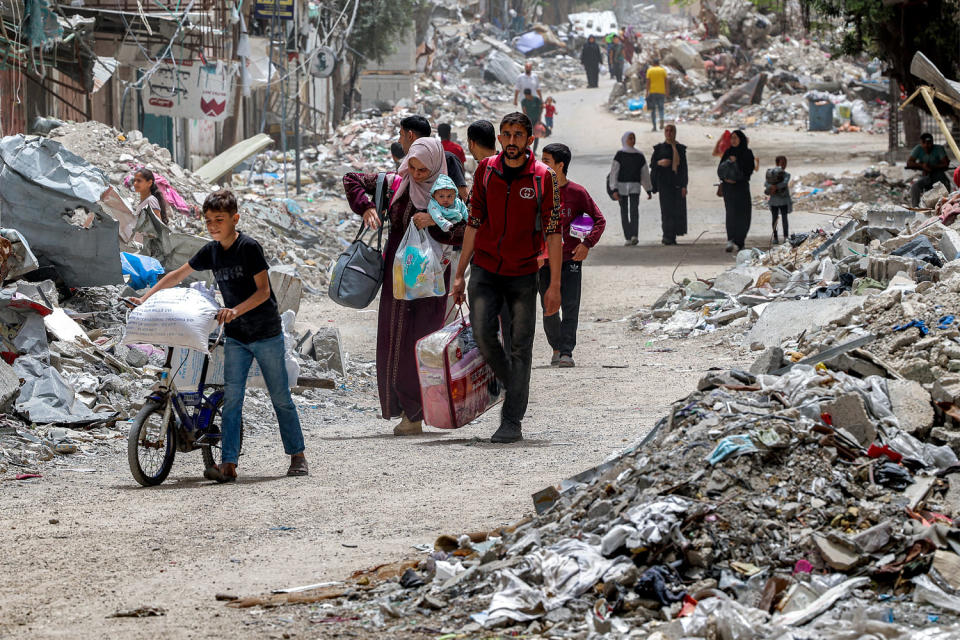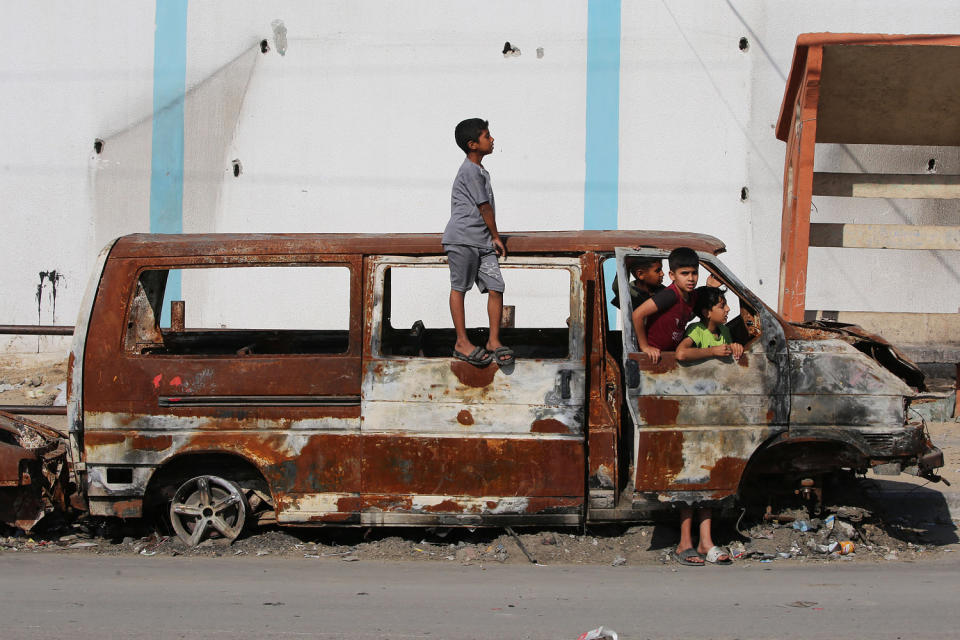U.S. warns Israel has no plan to eliminate Hamas as IDF battles regrouped militants in northern Gaza
- Oops!Something went wrong.Please try again later.
TEL AVIV — The Israeli military intensified its attacks on northern Gaza on Monday, battling a regrouped Hamas in areas it said it had cleared and renewing questions over Israeli strategy in the war as the United States issued some of its harshest public criticism yet.
Israel has insisted that it must invade Rafah, a city in southern Gaza where more than 1 million people had sought refuge, in order to accomplish its core objective of "eliminating" Hamas' presence in the enclave after months of fighting further north.
But Secretary of State Antony Blinken warned Sunday that even a full-scale ground assault on Rafah would fail to achieve that goal.
Israel is "on the trajectory, potentially, to inherit an insurgency with many armed Hamas left or, if it leaves, a vacuum filled by chaos, filled by anarchy and probably refilled by Hamas,” he said in an interview on NBC’s “Meet the Press.”
"Even if it goes in and takes heavy action in Rafah, there will still be thousands of armed Hamas left," Blinken said, noting that "we’ve seen, in areas that Israel has cleared in the north, even in Khan Younis, Hamas coming back."

Already, he said, Israel's offensive has led to a "horrible loss of life of innocent civilians," with the death toll in the Gaza Strip soaring over the weekend past 35,000, according to local health officials. He also noted the Biden administration's recent report, which found that Israel's use of weapons provided by the United States likely violated international humanitarian law.
Blinken said that instead of focusing on an assault on Rafah, Israel should prioritize presenting a credible post-war plan for Gaza.
"We’ve been talking to them about a much better way of getting an enduring result, enduring security," said Blinken, who spoke with Israeli Defense Minister Yoav Gallant on Sunday in a call reiterating U.S. opposition to "a major military ground operation in Rafah," according to the State Department. Gallant's office said he had discussed issues including "the precise operation in the Rafah area against remaining Hamas battalions."
The call came amid mounting splits between the two close allies over Israel's handling of its deadly military offensive in Gaza.
Talks for a new cease-fire deal have seemingly broken down, and President Joe Biden threatened last week to halt the shipment of certain arms to Israel should it launch a full-scale assault on Rafah.
Nearly 360,000 people have fled the city since Israel ordered a partial evacuation a week ago and sent tanks in, according to the United Nations.
That led to the closing of two main border crossings into the Palestinian enclave, sparking outcry from doctors and aid groups, while officials warned Monday that the health system was on the verge of collapsing because of dwindling supplies of food and fuel.
"We are only a few hours away from the collapse of the health system in the Gaza Strip as a result of the failure to bring in the fuel needed to operate electricity generators in hospitals, ambulances and transport employees," the Gaza Health Ministry said.
The Israel Defense Forces said last week that the Kerem Shalom crossing — where four IDF soldiers had been killed in a Hamas attack — had reopened and announced Sunday the opening of a separate crossing in northern Gaza, the “Western Erez” crossing, in coordination with the U.S.
The Palestinian Crossings Authority has disputed claims that Kerem Shalom has been open in recent days, while a senior U.N. official told NBC News that while it was technically open, it has been extremely difficult for humanitarian organizations to reach and distribute aid entering through the crossing.
“The U.N. is only able to collect very limited types of aid under very challenging circumstances,” said Georgios Petropoulos, head of the U.N. Office for the Coordination of Humanitarian Affairs (OCHA) mission in Gaza. The Rafah crossing, the main lifeline for aid into Gaza, has been closed since it was seized last Tuesday by Israeli forces.
On Monday, the office of U.N. Secretary-General António Guterres confirmed the death of a staff member in a strike in Rafah as a U.N. vehicle was on its way to a hospital. Another staff member was injured.
Guterres called for a full investigation in a statement from his deputy spokesperson.
"With the conflict in Gaza continuing to take a heavy toll — not only on civilians, but also on humanitarian workers — the Secretary-General reiterates his urgent appeal for an immediate humanitarian ceasefire and for the release of all hostages," the statement said.
The IDF said earlier in the day that two of its soldiers were seriously injured in southern Gaza, as well as a civilian contractor working on behalf of Israel's Defense Ministry. According to the military statement, two other people who were on missions in the area were "lightly injured."
The military said later in a statement that the incident involving two members of the U.N. Department of Safety and Security is under review and that the IDF had not been made aware of the vehicle's route.
"An initial inquiry conducted indicates that the vehicle was hit in an area declared an active combat zone," the IDF said.
Meanwhile, northern Gaza has been isolated for months, with the head of the World Food Programme telling NBC News earlier this month that she believes there is a “full-blown famine” in the area.
Yet, despite the toll of Israel's military operation on civilians in Gaza, Hamas appeared far from beaten.
The IDF said Sunday that its forces had launched an operation around the Jabalia camp in northern Gaza after issuing calls for civilians to "temporarily evacuate" the area. The IDF said it was acting on intelligence regarding "attempts by Hamas to reassemble its terrorist infrastructure and operatives in the area."
The IDF said the assault was unfolding alongside military action in the area of Zeitoun in Gaza City as its troops also pushed deeper into Rafah.
Hamas' military wing, Al-Qassam Brigades, said in a statement on Telegram early Monday that militants were still "engaged in fierce clashes" east of the Jabalia camp, as well as in the south.

U.S. national security adviser Jake Sullivan suggested in a phone call with his Israeli counterpart, Tzachi Hanegbi, on Sunday that instead of invading Rafah, "alternative courses of action" could be necessary to ensure that Hamas is defeated "everywhere in Gaza," according to a readout of the call.
Israeli forces launched their assault following Hamas’ Oct. 7 attack, in which some 1,200 people were killed and around 250 others were taken hostage, according to Israeli officials, marking a major escalation in the decadeslong conflict. More than 130 people remain held captive in Gaza, with at least a quarter of the hostages believed to be dead.
Raf Sanchez reported from Tel Aviv and Chantal Da Silva from London.
This article was originally published on NBCNews.com

